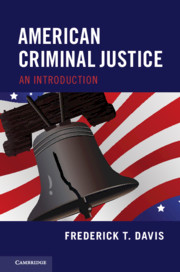Book contents
- American Criminal Justice
- American Criminal Justice
- Copyright page
- Dedication
- Contents
- Acknowledgments
- 1 Introduction
- 2 The Federal Structure; Sources of the Law
- 3 Investigation and Evidence-Gathering—The Participants
- 4 Investigation and Evidence-Gathering—Procedures
- 5 Arrest and Pretrial Detention
- 6 The Decision to Prosecute, or Not
- 7 Joinder of Charges and Defendants
- 8 Venue
- 9 Assistance of Counsel
- 10 Trial Rights and Preparation for Trial
- 11 Alternative Outcomes
- 12 Double Jeopardy
- 13 The Trial
- 14 Sentencing
- 15 Appeals
- 16 Corporate Criminal Responsibility
- 17 Internal Corporate Investigations
- 18 Professional Responsibility
- 19 Conclusion
- Bibliography
- Index
6 - The Decision to Prosecute, or Not
Published online by Cambridge University Press: 08 June 2019
- American Criminal Justice
- American Criminal Justice
- Copyright page
- Dedication
- Contents
- Acknowledgments
- 1 Introduction
- 2 The Federal Structure; Sources of the Law
- 3 Investigation and Evidence-Gathering—The Participants
- 4 Investigation and Evidence-Gathering—Procedures
- 5 Arrest and Pretrial Detention
- 6 The Decision to Prosecute, or Not
- 7 Joinder of Charges and Defendants
- 8 Venue
- 9 Assistance of Counsel
- 10 Trial Rights and Preparation for Trial
- 11 Alternative Outcomes
- 12 Double Jeopardy
- 13 The Trial
- 14 Sentencing
- 15 Appeals
- 16 Corporate Criminal Responsibility
- 17 Internal Corporate Investigations
- 18 Professional Responsibility
- 19 Conclusion
- Bibliography
- Index
Summary
Prosecutors have virtually unfettered discretion over how to enforce the law, and in particular whether or not to prosecute a particular case. In the United States, there is no “principle of legality” that appears in the legal systems of some European and other countries providing that a prosecutor has a legal obligation to prosecute any case for which facts capable of proving guilt are present. As a result, many important decisions by a prosecutor are not reviewed by a judge or anyone else. This independence of the prosecutor—highly unusual by international standards (see Chapter 19)—is driven by the principle of separation of powers, which has been interpreted to mean that the Constitution allocates all such powers exclusively to the executive branch. Further, prosecutors are not held personally accountable for their prosecutorial decisions; they have virtually complete immunity from any legal challenge to their actions.
- Type
- Chapter
- Information
- American Criminal JusticeAn Introduction, pp. 44 - 48Publisher: Cambridge University PressPrint publication year: 2019



